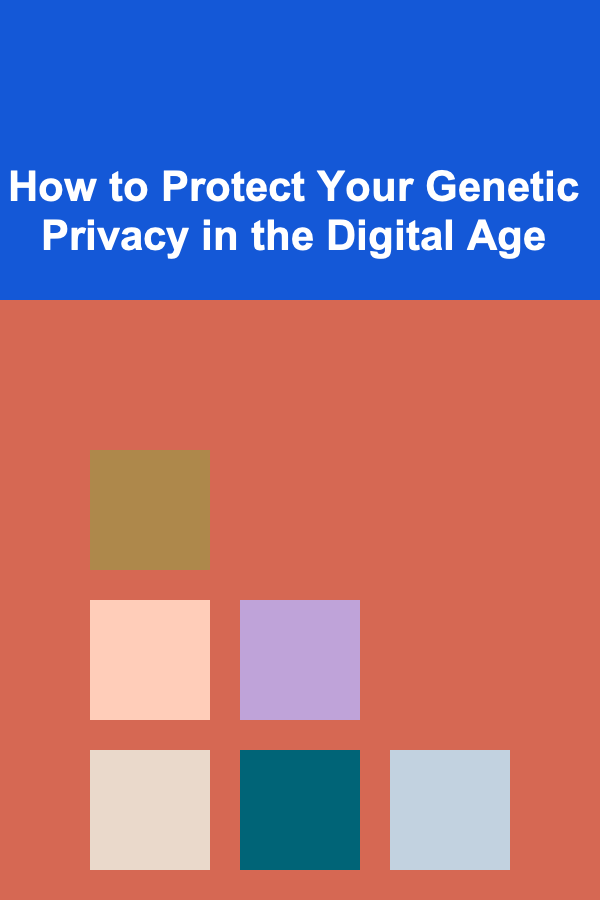
How to Protect Your Genetic Privacy in the Digital Age
ebook include PDF & Audio bundle (Micro Guide)
$12.99$9.99
Limited Time Offer! Order within the next:

In the digital age, privacy is a growing concern, and one area that is often overlooked is genetic privacy. With the advent of genetic testing, the increasing popularity of direct-to-consumer genetic services, and the rise of genetic data sharing in healthcare and research, individuals are more at risk than ever of having their genetic information exposed, misused, or exploited.
Genetic privacy refers to the right to control access to and the use of your genetic data. In many ways, your genetic information is one of the most personal and sensitive aspects of your identity. It can reveal things about your health, family history, and even predispositions to certain conditions. As a result, it is crucial that individuals take steps to protect their genetic privacy, especially in the context of the increasingly digitized world in which we live.
This article will explore the importance of genetic privacy, the risks associated with genetic data exposure, and the steps individuals can take to protect their genetic privacy in the digital age.
The Importance of Genetic Privacy
1. The Sensitivity of Genetic Data
Genetic data is inherently sensitive because it contains a wealth of information about an individual. It can provide insights not only into one's health but also into their family history, ancestry, and potential future medical conditions. For example, a person's genetic code can reveal whether they are at a higher risk for diseases such as cancer, heart disease, or Alzheimer's. This information is so personal that it can have a profound impact on an individual's life, relationships, and opportunities.
For this reason, genetic information is considered by many to be more sensitive than other types of personal data. Unlike financial or medical records, which are typically protected under various privacy laws, genetic information is still in a somewhat gray area when it comes to legal protection.
2. Genetic Data as a Tool for Discrimination
Another critical reason to protect genetic privacy is the potential for discrimination. Genetic data can reveal predispositions to certain diseases or conditions, and if this information were to fall into the wrong hands, it could lead to discrimination in several areas, such as:
- Health insurance: Insurers could use genetic data to deny coverage or charge higher premiums to individuals who are found to have genetic markers for certain conditions.
- Employment: Employers might use genetic information to make hiring decisions or discriminate against individuals who are perceived as more likely to develop costly health conditions.
- Genetic surveillance: Governments or corporations could use genetic information for surveillance purposes, tracking individuals' health and genetic traits in ways that infringe on privacy.
These forms of discrimination are not only unethical but could have lasting impacts on individuals' lives. Therefore, it is crucial to ensure that genetic data is kept private and secure.
3. Genetic Data and Family Implications
Your genetic information doesn't just belong to you---it also includes data about your family. Genetic testing can reveal information about your relatives, including potential health risks that may not be known to them. For example, if an individual discovers that they carry a gene for a certain condition, it may imply that their siblings or parents also carry that gene, even if they haven't been tested.
Thus, genetic privacy is not only an individual concern but also one that extends to families. The release or exposure of someone's genetic data could have ramifications for an entire family, potentially leading to privacy violations for individuals who have not consented to the testing or sharing of their data.
The Risks to Genetic Privacy in the Digital Age
1. Direct-to-Consumer Genetic Testing
In recent years, the rise of direct-to-consumer (DTC) genetic testing services such as 23andMe, Ancestry.com, and others has made genetic testing more accessible than ever before. While these services offer valuable insights into ancestry, health risks, and genetic traits, they also raise significant concerns about privacy. Many of these companies store vast amounts of sensitive genetic information on their servers, and consumers may not fully understand the risks involved in sharing this data.
Some of the potential risks associated with DTC genetic testing include:
- Data breaches: As with any company that handles sensitive data, there is always the risk of data breaches. If these companies are hacked or fail to secure their databases properly, users' genetic information could be exposed.
- Third-party access: Many DTC companies share data with third parties for research purposes. While this can advance scientific knowledge, it also means that your genetic information could be sold or used without your consent, and you may not even know where your data ends up.
- Commercial exploitation: Your genetic data could be used by pharmaceutical or biotechnology companies to develop new products, but these companies may profit from your data without compensating you.
Understanding the terms of service and the privacy policies of these companies is essential before submitting genetic data for analysis.
2. Genetic Data in Healthcare
Healthcare systems are increasingly using genetic testing to better understand patients' conditions and personalize treatments. However, this also presents risks to genetic privacy. While healthcare providers and researchers have an obligation to protect patient data, the digitalization of health records and genetic information creates new vulnerabilities.
For example:
- Health data breaches: If healthcare providers fail to adequately secure electronic health records, genetic data could be compromised in a data breach.
- Sharing with insurers: In some cases, genetic data from healthcare providers could be shared with insurance companies, potentially influencing the cost or availability of health coverage.
- Genetic data in research: Researchers often rely on genetic data for scientific studies, but this data may not always be fully anonymized. As a result, individuals' genetic information could be linked back to them through public databases or re-identification techniques.
3. The Potential for Gene Editing and Modification
As gene editing technologies like CRISPR continue to evolve, they present new challenges to genetic privacy. While gene editing holds the potential to cure genetic diseases and improve health outcomes, it also raises ethical concerns about privacy and consent. The ability to modify genes means that genetic information could be altered or exploited in ways that individuals might not fully understand.
The manipulation of genetic data could lead to new forms of surveillance or even genetic "enhancement" practices, potentially placing individuals at risk for privacy violations. In such scenarios, it's essential that laws and regulations are put in place to protect genetic information from misuse.
How to Protect Your Genetic Privacy
1. Educate Yourself About Your Rights
Before submitting your genetic data to any service or healthcare provider, it is crucial to understand your rights regarding genetic privacy. Many countries have laws that regulate genetic testing and the use of genetic data, such as the Genetic Information Nondiscrimination Act (GINA) in the United States, which prohibits discrimination based on genetic information in health insurance and employment.
You should:
- Understand the laws in your country: Research local laws and regulations regarding genetic privacy and the protection of genetic data.
- Know the terms of service: When using a genetic testing service, thoroughly read their privacy policy and terms of service to understand how your data will be used, shared, and stored.
2. Be Cautious About Sharing Your Genetic Data
One of the most important steps you can take to protect your genetic privacy is to be cautious about sharing your genetic information. If you choose to undergo genetic testing, ask yourself the following questions:
- Do you fully understand the implications of sharing your data?
- Are you comfortable with the company's privacy policies?
- Do you trust the company to safeguard your genetic data?
It's essential to know where your data is stored and how it is used. Avoid uploading your genetic data to public databases unless you are fully aware of the potential consequences.
3. Use Secure Platforms and Services
When using online genetic testing or health services, always ensure that the platform is secure. Look for the following indicators of security:
- End-to-end encryption: Make sure that any platform you use encrypts your data both during transmission and at rest.
- Two-factor authentication: For added security, use services that offer two-factor authentication (2FA) to protect your account.
- Data anonymization: Choose services that anonymize or de-identify your genetic data, minimizing the risk of re-identification.
4. Control Your Data Sharing Preferences
Many companies and healthcare providers offer you the option to control how your genetic data is shared. Make sure you review and manage your sharing preferences, including opting out of data sharing for research purposes or third-party partnerships. By adjusting your settings, you can ensure that your data is not shared without your explicit consent.
5. Be Mindful of Family Implications
Remember that your genetic information may have implications for your family members as well. Before undergoing genetic testing or sharing your results with others, consider how this may affect your family. For example, if you discover that you have a genetic predisposition to a condition, it may be important to inform your relatives so they can make informed decisions about their own health.
Conclusion
In the digital age, protecting genetic privacy is essential to safeguard personal, family, and societal interests. With the rapid advancements in genetic testing, healthcare, and data sharing, individuals must take proactive steps to ensure their genetic information remains secure and used only with their consent. By educating yourself about your rights, being cautious about sharing genetic data, using secure platforms, and managing your privacy preferences, you can protect your genetic privacy and preserve your autonomy in the digital age.
As the digital landscape continues to evolve, ongoing awareness and vigilance will be necessary to protect sensitive personal data and ensure that genetic privacy remains a priority for individuals and society as a whole.
Reading More From Our Other Websites
- [Organization Tip 101] How to Keep Your Fishing Gear Dry and Mold-Free
- [Simple Life Tip 101] Best Simple Recipes for a Healthy & Happy Life
- [Home Space Saving 101] How to Make the Most of Under-Bed Storage for Extra Space
- [Personal Investment 101] How to Invest in Farmland Without Buying Acres of Land
- [Home Pet Care 101] How to Choose Pet Toys That Are Both Engaging and Safe for Chewers and Playful Pups
- [Home Soundproofing 101] How to Identify and Seal Sound Leaks in Your Home
- [Home Pet Care 101] How to Choose a Vet Who Offers Excellent Home Visit Services for Anxious Pets
- [Needle Felting Tip 101] Choosing the Right Needle Size: A Beginner's Cheat Sheet
- [Home Pet Care 101] How to Use Pet-Safe Pest Control in Your Home
- [Personal Care Tips 101] How to Make Your Hair Shine with the Right Dry Shampoo

How to Organize Your Budget Around Your Values
Read More
How to Plan a Family DIY Movie Theater Experience at Home
Read More
How to Stage Your Living Room to Maximize Space and Comfort
Read More
How to Optimize Augmented Reality (AR) for Different Devices
Read More
10 Tips for Mastering the Art of Pie Crust
Read More
How to Build a REST API with Node.js and Express
Read MoreOther Products

How to Organize Your Budget Around Your Values
Read More
How to Plan a Family DIY Movie Theater Experience at Home
Read More
How to Stage Your Living Room to Maximize Space and Comfort
Read More
How to Optimize Augmented Reality (AR) for Different Devices
Read More
10 Tips for Mastering the Art of Pie Crust
Read More